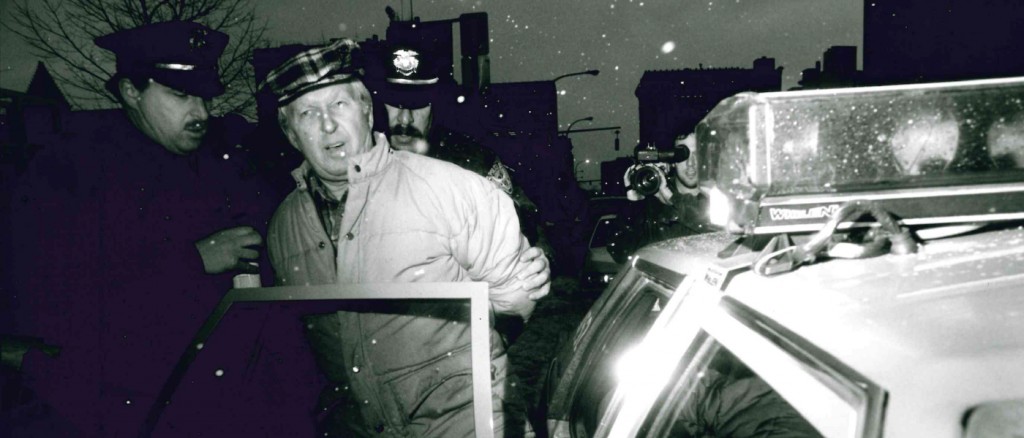In the sanctuary of the church where his photograph has hung for years beneath the image of his departed brother Phil and his ailing brother Dan, the two men that Jerry Berrigan’s daughter Carla described as her father’s “heart and soul,” Berrigan once again drew the people of St. Lucy’s on Gifford Street together on July 29 to sing, pray, laugh, weep and say goodbye to the 95-year-old teacher and activist. Berrigan died July 26 after a life spent challenging war and injustice with faith and good humor in equal parts.
Church walls, in the Roman Catholic tradition, are usually reserved for images of saints and Stations of the Cross. St. Lucy’s, like Berrigan, is anything but traditional. The doors he passed through are adorned with the inviting banner “Sinners Welcome” and a quote from Pope Francis: “Who am I to Judge?”
While his famous priest brothers were gracing the cover of Time magazine, Jerry was raising a family on Onondaga Hill, teaching at Valley Academy, then Corcoran High School, and for 40 years at Onondaga Community College. He taught English, but his example taught students how to live a life of conscience. One lesson recalled by many was the day when U.S. marshals showed up at the door to his classroom and took him away in cuffs. Jail was the price he was willing to pay for his anti-war convictions.
What stands out most about the extraordinary life of Jerry Berrigan is in some ways how ordinary it was. While his accomplishments and the spirit of his life were in no way ordinary, the bones of the life that he and his wife, Carol, carried on seemed attainable, like something any one of us might live. He carried on what appeared on the surface to be a typical American middle-class life, all the while engaging in innumerable works of mercy, acts of resistance, and energetic organic gardening.
Carla Berrigan eulogized her father as a man who “had a way of making you want to be more, to give more, to do more. He had the most beautiful circle of friends, and beautiful blue eyes that looked into your soul.”
Berrigan, it was said by fellow activist Kathleen Rumpf, “was most himself when he was in handcuffs.” Among the places he felt the cuffs slapped on his wrists: Griffiss Air Force Base, the Pentagon, the School of the Americas in Georgia, and the Hanley Federal Building. He was nimble right into his 80s. I recall once covering a rally against the first Iraq war and seeing Berrigan hop up, sprint to the federal building, and paint the word “Shame” on the wall.
Berrigan had a rebel’s relationship with the law. He was arrested more than 30 times, beginning with a White House protest against the bombing of Cambodia in August 1973. Yet among the hundreds who packed the pews at St. Lucy’s to say goodbye to Jerry was a judge, a former police chief and a bishop.
In the back of the church I asked Onondaga County Court Judge Joe Fahey if he had ever been called upon to sentence Jerry for one of his many acts of civil disobedience. Fahey was quick to respond: “I would never have sentenced Jerry. I would have found a way to dismiss the charges.” Fahey came to the funeral mass to pay respects to Berrigan the teacher; Jerry was his English teacher at Corcoran High School decades back.
District Attorney Bill Fitzpatrick regretted that he was unable to attend the funeral. Fitzpatrick had been one of Berrigan’s neighbors back in the mid-1970s. The future DA and three of his law school buddies, a foursome he describes as “knuckleheads,” rented a house next to the Berrigan clan on Maywood Drive.
Fitzpatrick and his friends, then as now conservative Republicans, disagreed with Jerry on almost everything. Yet he couldn’t help but strike up a friendship with the family next door. “They were just so much fun,” recalls Fitzpatrick, who concedes that his youthful efforts to be a good neighbor might have fallen short of the mark. There were long hours of conversation among people whose political common ground was nil. And there was this: “Jerry and Carol were a riot.”
Fast-forward to 1991. A newly elected DA, Fitzpatrick runs into Carol Berrigan in the hallways of the courthouse. “I find out that some idiot has indicted Jerry Berrigan for a felony, and since he has a felony conviction that means state prison time. I said to Carol, ‘Can’t he just plead guilty and we’ll get rid of it?’”
Jerry is adamant, says Carol. He won’t admit that in his protest he did anything wrong.
Fitzpatrick made it his business to take the case to the judge and found a way to get the charges dropped. “We called it disorderly conduct. I asked Jerry if he had been disorderly. He agreed that he had been. We settled the case. Jerry got to walk away happy.”




